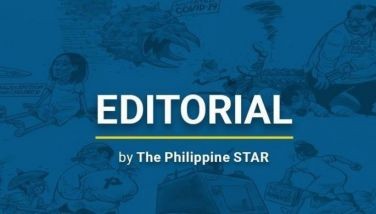Motion to quash

Two years ago, I was hospitalized for almost a week in Laos for spinal stenosis, a serious and excruciating back condition. I was then on a tour of Vientiane with my family. It is among several ailments that has plagued me for a long time. Last Sunday, I experienced a flare-up, so I am currently under painkillers. I have already sought help from my doctor. Since it impairs my mobility, I failed to attend to my duties and appointments for the week.
Last Wednesday, I filed a quashal motion on the subpoena issued by the House of Representatives quad committee on Aug. 22, which required me to submit several documents about the financial history of my family. As a resource person, I have attended the ongoing investigation of the joint committees on dangerous drugs, public order and safety, human rights and public accounts on illegal Philippine offshore gaming operators (POGO) or internet gaming licensees (IGL).
The quad comm has ordered me to submit the following documents: my Statement of Assets and Liabilities from 2016-2022, my and my wife’s Income Tax Returns (ITR) from 2014-2022 and our respective medical certificates, the extrajudicial settlement of the estate, including tax returns, of my late aunt and the deed of sale with tax returns and transfer of property of the 1.8-hectare property in Multinational Village, Parañaque that my family sold. The committee also asked me for the transfer of shareholdings to Atty. Percival Ortega with trust agreement and related documents submitted to the Securities and Exchange Commission (SEC), the ITR of Biancham Inc. and the statement of Biancham’s beneficial owner filed with SEC.
In my motion, I invoked my constitutional right to privacy, to remain silent and against self-incrimination. The Bill of Rights explicitly states that no person shall be compelled to testify against oneself (Section 17), private communication and correspondence are inviolable (Section 3) and any person being investigated has the right to remain silent (Section 12).
The requested private and personal documents are irrelevant and immaterial to the quad comm hearing. The documents are not germane to the subject of the inquiry. The release of my family’s financial and corporate history contravenes the House of Representatives’ rules of procedures governing inquiries in aid of legislation. The documents constitute a violation of my fundamental rights.
In Ong vs Senate (2023), the Supreme Court (SC) reminded the Upper Chamber to observe the constitutional right to due process of the persons appearing before legislative inquiries. Such proceedings must seek to aid legislation and not to conduct a trial or make an adjudication.
The Court also stressed that the congressional power to investigate is not absolute and is subject to constitutional limitations (Section 21, Article 7). Inquiries must aid legislation, follow published rules of procedure and respect the rights of those appearing in or affected by the inquiries. I submit that the House order violates the said limitations.
There is a precedence to my quashal motion. In Bengzon vs. Senate (1991), the High Court stopped a corruption inquiry of the Blue Ribbon committee on a relative of then-president Cory Aquino. The SC reasoned it would have violated a person’s right to the presumption of innocence, including remaining silent and incriminating himself.
In the 8th Congress, the committee investigated Mr. Ricardo Lopa, who was allegedly involved in the equity sale of at least 36 corporations owned by former Ambassador Benjamin Romualdez. The committee wanted to determine if Mr. Lopa violated the Anti-Graft and Corrupt Practices Act. The petitioners, led by Atty. Jose F.S. Bengzon, asked the SC for a prohibition against the committee, which required them to testify and produce evidence related to the inquiry.
Since the petitioners were impleaded in a case before the Sandiganbayan, the High Court prevented the committee from compelling them to participate in the proceeding. The SC said the committee inquiry was not in aid of legislation because it was not related to a purpose within the jurisdiction of Congress. The graft investigation fell under the province of the courts rather than the legislature. The Court also asked the Senate to respect the rights of an individual to due process and not be compelled to testify against himself.
In my case, the required documents and information have nothing to do with the POGO investigation. As explained by the SC in Arnault vs. Nazareno, an investigator cannot coerce a witness to answer a question unrelated to the subject of the inquiry.
My financial and corporate history has nothing to do with illegal POGOs. The corporations I helped set up date to 2014. Most of my business transactions transpired long before I met some individuals from Whirlwind Corporation in 2022. The properties that my family sold and bought transpired before the 2019 incorporation of Lucky South. Whirlwind representative Cassandra Ong has cleared my name in a quad comm hearing. I was never a legal representative of Lucky South.
Moreover, Section 9 of the House Rules provides that inquiries shall respect the rights of witnesses, including their right against self-incrimination. The release of the documents violates my right to privacy. The European Convention on Human Rights states that public authority must respect the right of every individual to his private and family life, his home and his correspondence (Article 8).
The right to private and family life protects both public figures and ordinary citizens from intrusive articles and photos that do not, in any way, represent public concern. In 2004, the European Court of Human Rights (ECtHR) ruled that several German publications violated the Article 8 privacy rights of Princess Caroline of Monaco. The press published several photos of the princess in swimwear. In 2001, the ECtHR found the Daily Mirror guilty of breaching the privacy, confidence and data protection of model Naomi Campbell for publishing her photos leaving a Narcotics Anonymous meeting.
Thus, private matters that have no bearing on pressing national concerns or adversely affect the lives of the citizens do not deserve public, media or legislative scrutiny. Again, my personal life or financial history has nothing to do with any illegal gaming activity.
- Latest
- Trending
























